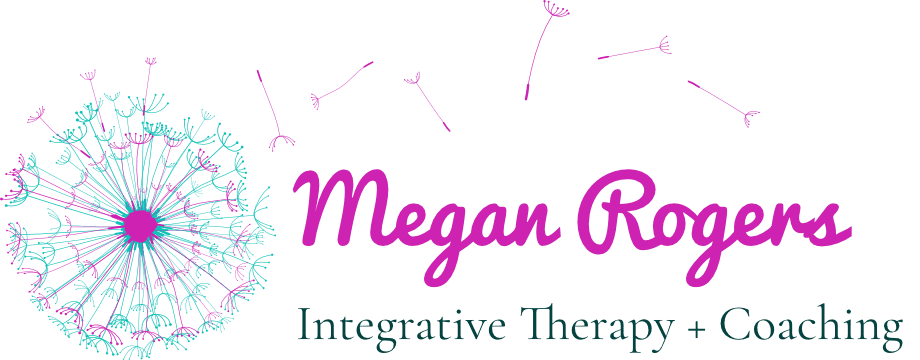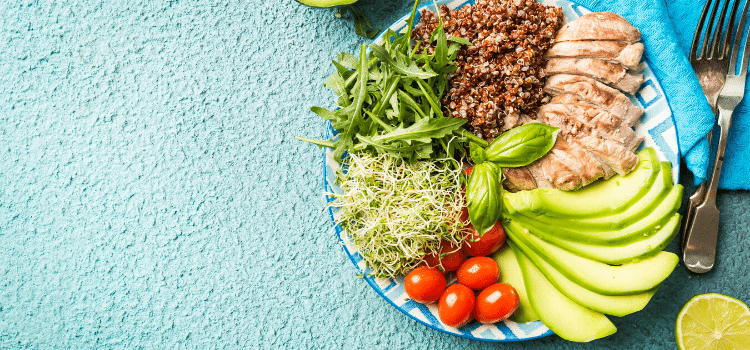I’ve been curious about the impact of food and nutrition on depression and mental health for over a decade now.
I’ve shared before that I started to see big improvements in my own mental health once I increased my awareness of what I was eating. All of that started when I hired a health coach way back in 2005. To this day, it was one of the best investments I’ve ever made in myself, because it started a health trajectory that just keeps going and going.
Don’t get me wrong. If you are struggling with severe depression, a handful of nuts and a piece of salmon aren’t going to produce a change overnight. But what will help is taking steps toward a diet comprised mostly of whole foods, eating at regular intervals to stabilize blood sugar, and trying to steer clear of processed stuff as much as possible.
Please note: I’m very aware of the potential anti-diet culture push-back here. As someone in eating disorder recovery and someone very anti-diet, I do have to acknowledge that there are some foods that make us feel better than others, and that no one way of eating works for everyone.
There are foods that are more helpful for digestion, blood sugar balance, focus and concentration, energy, and yes, mood.
I don’t believe that food has a moral component; i.e., there are no “bad” foods, but I do believe that our brains and bodies work better for us when we feed them as nutritionally-rich as possible, most of the time. There are also certain foods that, for certain people, can increase risk of depression (aspartame, trans fats, gluten, and dairy, for some people).
Don’t get mad at me, friends. This is backed up by both science and personal experience. The two most important keys are, rather than to make any foods off-limits, to:
- increase your consumption of whatever brain-supportive foods you enjoy
- make sure you’re eating regularly!
Don’t get too caught up in what you should/shouldn’t eat to help depression, because that’s an almost guaranteed way to feel like crap (and we know, restrictive diets always come back to get us at some point and mess up our bodies in the process!). So, for sure, I eat ice cream and pizza and many other “non-health-foods” with the best of them, and probably more often than you might think. I just eat these things, too.
So, with that said, I’m happy to share with you some of the most mood-supportive foods and encourage you to add them into your meals as much as you’d like. I mainly look toward Mediterranean-type ingredients, because there’s the most promising research here for both brain and heart health, and also because it’s such a delicious cuisine! These foods will boost neurotransmitters, balance blood sugar, and give us sustainable energy, all of which are needed to feel better and less mood-swing-y. This list is basic and intended as a general guide. If you’re interested in learning more about specific food/nutrient properties, please do discuss with your natural health practitioner!
FRUITS AND VEGGIES
Clearly, you can’t go wrong with this food category. It’s one that almost all “diets” agree on. I’m not a huge fruit fan myself, but I’m a big fan of all vegetables. Fruits and veggies provide us with tons of brain-healthy nutrients: Vitamins A and C, fiber, folate, calcium, magnesium, iron, and potassium are big ones, depending on what you’re eating. And phytonutrients! These come in colorful foods and are important for immunity, brain function, antioxidizing and anti-aging, to name a few benefits. Long story short, eat the rainbow (but especially greens!) and you don’t have to worry much about these individual nutrients.
NUTS AND SEEDS
Nuts and seeds can be great sources of zinc, iron, magnesium, and Vitamins E, as well as some fat and protein. Adequate magnesium is essential for serotonin, one of our anti-depressant neurotransmitters. And fat and protein are essential for, like, everything.
GRAINS AND LEGUMES
If you digest these well, eat up! Whole grains and legumes are complex carbs, which are also great boosters for serotonin. Complex carbs also take longer to digest, so they don’t cause blood sugar spikes and help keep our moods stable. These are some reasons why many people experience mood dips when on a low-carb meal plan (which I would not recommend to any of my clients!). Legumes and grains are high in B vitamins, especially folate, and because they’re a decent source of protein and fiber, also help us with energy and cravings. They’re also a good source of minerals like magnesium, selenium, calcium, and potassium, depending on the type.
ANIMAL PROTEIN (MEAT, DAIRY, EGGS)
Ohh, you guys. This is a tricky one for many of us. Full disclosure here: I used to be vegetarian, then vegan, for years. I still ethically struggle with eating animal protein, and cow dairy messes with my skin and digestion quite a bit, so I get most of my animal protein from seafood and eggs. The thing is that it is pretty tough to get everything you need from a strict plant-based diet without supplementing, and this is especially true if you have mood, hormonal, eating disorder, or addiction issues (which I do, ::raises hand for all of these::). Eggs are a great source of B vitamins and protein, but you’ve gotta eat the whole egg – none of this skipping-the-yolk crap. B vitamins can improve depressive symptoms as well as brain function overall.
If you can tolerate it, Greek yogurt is also a great source of protein, as well as probiotics. Probiotics are necessary for a healthy gut, where (surprise!) your body makes most of it’s serotonin. Gut and brain health are truly inseparable.
In short, what we mostly need here is the protein content, as protein contains many amino acids that are the precursors to our neurotransmitters (like serotonin, dopamine, and norepinephrine). Protein helps us with mood, energy, focus, sleep, muscle mass and body composition, stable blood sugar levels.
SEAFOOD
Brain food! I’ve made this its own category because seafood has proven to be so helpful for depression, because it’s a great source of protein but even more so due to the omega-3 content found in cold-water fish like wild salmon, but also in sardines, anchovies, mackerel, tuna, oysters, and herring. The health benefits of omega-3 fatty acids are really impressive: improving depression, anxiety, and insomnia, supporting our central nervous system, cardiovascular health, and cellular communication.
Fish oil or cod liver oil supplements are a good way to support this if you, like me, don’t eat fish at least 3 times a week. Both fish and fish oil supplements should be responsibly sourced due to environmental toxin and sustainability concerns; be sure to eat your salmon wild and get your pills from a good company.
(also see “FATS” below!)
FATS
As stated above, fats really are brain food and are an all-around anti-inflammatory for the whole body. (Approximately 60% of our brains are made of fat!) Seafood is going to have the most bioavailable essential fatty acids (EPA and DHA). Plant-based fatty acids found in flax, chia, hemp, and nuts (walnuts, pecans, almonds) will need to be converted (but are still generally great for most people!).
Also great for just-about-everything including depression? Monounsaturated fats like olives/olive oil and avocado. (Though it’s probably a combination of the fat and anti-oxidants in these foods that make them great for the brain.)
CHOCOLATE
Yes (hand-clap emoji)! Cacao (the raw form of cocoa, or chocolate) really does release endorphins in the brain! It also contains magnesium and valeric acid. Both help us to feel calm and relaxed, and flavenols to boost brain function. A simple Internet search yields the most delicious recipes with raw cacao and unprocessed sweeteners, like dates and raw honey. In a pinch, pieces of a dark chocolate bar will do wonders. Isn’t this great news?


